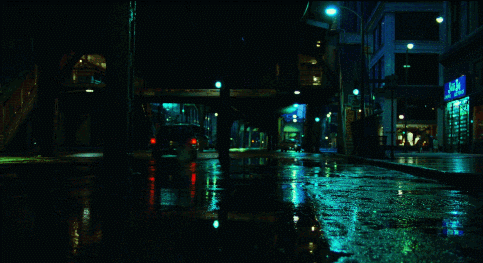
Both John Woo and Quentin Tarantino have cited Melville as a major influence, though neither seem to have imbibed much of the characteristic restraint and understatement of his movies. The greatest marriage of French and American sensibilities comes in the austere and magisterial work of Jean-Pierre Melville. Form Rififi onwards, the devil was in the details, and the suggestion of an influence on real-life criminals and robberies would become an intrinsic part of the mystique of the heist movie.
#Thief 1981 cinematography full
While Rififi begins to introduce a subtly Gallic component to the tone of the American model, its chief contribution is stylistic, and comes in the bravura execution of the heist sequence itself: nearly a full half hour of silent, scoreless, meticulously detailed tension.
#Thief 1981 cinematography movie
The next major innovation in the heist movie came via Rififi (1954), a picture made in France by the American noir specialist Jules Dassin, who was at that time newly fled from the black-list in Hollywood. Perhaps the first great crime procedural, it is the achievement of Huston’s film to perfectly distil the basic narrative form of the heist movie, which can be broken down into a tripartite structure: the period of careful preparation leading up to the heist, the heist itself, and finally, the generally tragic aftermath of the heist, in which everything comes undone. (The concept of film noir is itself a cross-fertilization between American popular culture and a more cerebral French criticism.) The grand ur-text of the heist movie is John Houston’s classic of hard-boiled poetry The Asphalt Jungle (1950). This is accurate enough, but it is perhaps better to envision Thief as the culmination of a chain of influence which begins in American popular cinema, flourishes in France, and is subsequently repatriated back to its native soil via Mann’s crime cinema.


Many critics have tended to place Thief, and its close thematic relative Heat, within a French tradition of psychologically and existentially sophisticated genre cinema, based around the detailed exposition of a central heist and its messy consequences. As such, all Mann’s subsequent movies can be viewed as increasingly sophisticated additions and variations on the groundwork established with such unusual clarity of intent with this first outing. it establishes familiar Mann themes which have been so widely discussed as to barely warrant commentary: its principal conflict is waged between the demands of an extreme form of masculine individualism and commitment to personal vocation, as against those of domesticity, emotional security, and the more stable and integrated spectrum of society. Thief tentatively stakes out the primary visual milieu of virtually all the directors subsequent work, which in many respects is the quintessential concern of noir cinema: an exploration of the alternatively seductive and dehumanising characteristics of the nocturnal urban environment. Viewed from the perspective of Mann’s subsequent work, it seems extraordinarily mature for an opening salvo. Despite being a very fine film, and featuring easily the most remarkable performance of James Caan’s career, it’s not widely remembered by general audiences today. Thief (1981) is Michael Mann’s first theatrical feature. In the run-up I'm hoping to post an essay on each of Mann's films, leaving aside The Jericho Mile and The Keep for the moment.) Tim Waverla on Criterion Project #19: METROPO…įilm-authority.(This summer sees the release of Public Enemies, Michael Mann's tenth theatrical feature.

There’s a bloodline between Frank from Thief and McCauley (Robert DeNiro) from Heat. I’d seen Mann’s Collateral (2004) and his 1995 opus, Heat, and you can undoubtedly see the skeletal outline of the latter in this film. This was actually my first time watching Thief. The bursts of violence, the sense of dread, smoky bars, creepy old white guys playing heavies, the neon-coated night sky. While that was technically a non-sequitur, I think there is some crossover in narrative archetypes between genres.Īs previously stated, this is Mann’s first feature and the filmmaking on display reminded me of another auspicious introduction, Joel and Ethan Coen’s 1984 debut, Blood Simple.


 0 kommentar(er)
0 kommentar(er)
